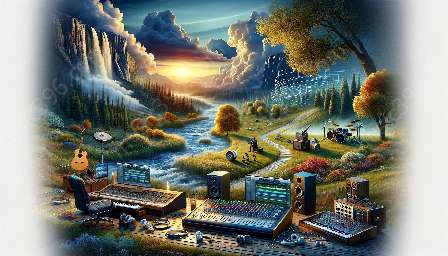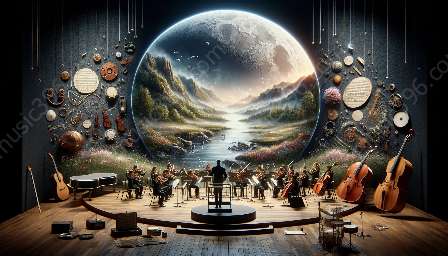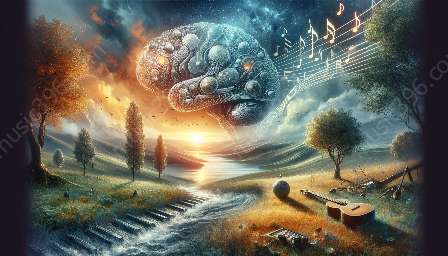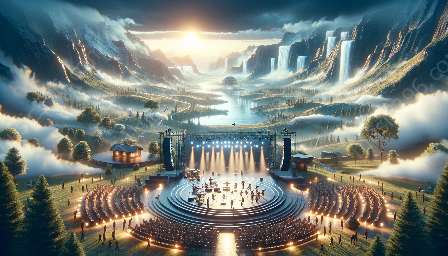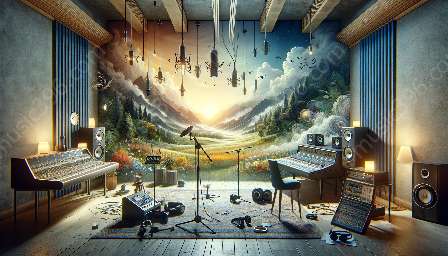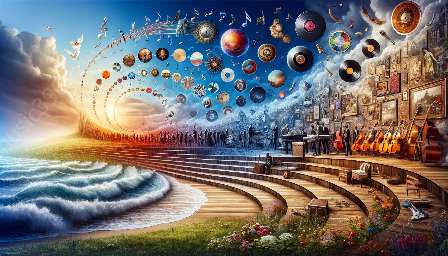Music genres have always been in constant evolution, influenced by a wide range of factors such as technological advancements, socio-cultural changes, and shifting consumer behaviors. As we move into the future, it's essential to explore the expected trends in the evolution and consumption of music genres. This topic cluster aims to delve into how the dynamic nature of music genres intersects with the evolving landscape of music reference and what it means for the future of music consumption.
The Evolution of Music Genres
The history of music is a colorful tapestry woven with various genres that have emerged and evolved over time. The evolution of music genres has been shaped by cultural, social, and technological factors, reflecting the spirit of different eras and the diverse influences that have converged to create new musical styles. The evolution of music genres is not linear; it is a complex web of influences and cross-pollination that continually redefines and reshapes the musical landscape.
One notable trend in the evolution of music genres is the blurring of traditional genre boundaries. As artists continue to experiment and innovate, merging elements from different genres, we witness the emergence of hybrid genres that defy categorization. This trend challenges the conventional notions of musical genres and paves the way for new and diverse sonic experiences.
Technological Advancements and Music Genres
Technology has been a driving force behind the evolution of music genres. From the invention of recording technologies to the digital revolution, technological advancements have not only changed the way music is created and produced but also transformed the way it is consumed. The rise of digital platforms and streaming services has democratized access to music, allowing a more diverse range of genres to reach global audiences.
Moreover, advancements in music production tools and software have empowered artists to explore new sonic possibilities, leading to the creation of innovative genres and sounds. The era of digital music production has significantly lowered the barriers to entry for aspiring musicians, contributing to the proliferation of new and experimental music genres.
Changing Consumer Behaviors and Music Consumption
Consumer behaviors play a pivotal role in shaping the future of music genres and their consumption. As we look ahead, it's crucial to examine the shifting preferences and habits of music consumers. The rise of streaming platforms and personalized recommendations has ushered in an era of individualized music consumption, allowing listeners to explore a broader spectrum of genres and artists.
Another trend in music consumption is the increasing demand for immersive and interactive experiences. Virtual reality (VR) and augmented reality (AR) technologies are poised to revolutionize the way audiences engage with music, offering new avenues for creating multi-sensory experiences that transcend traditional genre boundaries.
Music Reference in the Digital Age
As music genres continue to evolve, the role of music reference becomes increasingly significant. Music reference encompasses the ways in which individuals discover, categorize, and contextualize music, influencing their preferences and musical explorations. In the digital age, music reference has undergone a paradigm shift, driven by the abundance of online resources and platforms.
The proliferation of music streaming services and social media has reshaped the landscape of music reference, providing users with a vast repository of music recommendations, reviews, and collaborative playlists. This democratization of music discovery has led to the diversification of musical tastes and the blurring of genre boundaries, as listeners are exposed to a multitude of musical influences and styles.
Future Trends in Music Genre Consumption
Looking ahead, the future of music genre consumption is poised to be shaped by several key trends. The continued democratization of music creation and distribution, fueled by technological advancements, is expected to lead to further genre hybridization and the emergence of niche genres catered to diverse audiences.
Furthermore, the integration of artificial intelligence (AI) in music curation and recommendation systems is projected to enhance personalized music experiences, offering tailored genre exploration and discovery. AI-powered music platforms have the potential to foresee consumer preferences and introduce listeners to new and niche genres that align with their evolving musical tastes.
Conclusion
The future of music genres and their consumption is a dynamic and multifaceted landscape, shaped by the interplay of technological innovations, changing consumer behaviors, and evolving music reference. As we anticipate the future trends in music genre evolution and consumption, it's crucial to recognize the transformative potential of these developments, and the impact they will have on the diversity and richness of the musical tapestry. By embracing the evolving nature of music genres and staying attuned to the changing dynamics of music reference, we can look forward to a future where musical exploration knows no boundaries and where listeners are continually enriched by diverse and innovative sounds.






